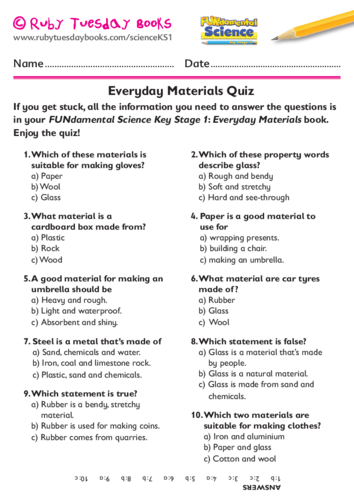
KS1 Science: Materials - Everyday materials quiz
A fun quiz which covers materials, their properties and suitability for different purposes. A great way to finish your materials topic. It could be done in teams or as individuals, or used for assessment. It complements our book ‘Everyday materials’ from our FUNdamental Science series. For more information, downloads and to purchase our books, please visit www.rubytuesdaybooks.com
This download helps meet the following National Curriculum targets:
Year 1 Science: Everyday materials
Statutory:
Distinguish between an object and the material from which it is made
Identify and name a variety of everyday materials, including wood, plastic, glass, metal, water, and rock
Describe the simple physical properties of a variety of everyday materials
Compare and group together a variety of everyday materials on the basis of their simple physical properties.
Notes and guidance (non-statutory)
Pupils should explore, name, discuss and raise and answer questions about everyday materials so that they become familiar with the names of materials and properties such as: hard/soft; stretchy/stiff; shiny/dull; rough/smooth; bendy/not bendy; waterproof/not waterproof; absorbent/not absorbent; opaque/transparent. Pupils should explore and experiment with a wide variety of materials, not only those listed in the programme of study, but including for example: brick, paper, fabrics, elastic, foil.
Pupils might work scientifically by: performing simple tests to explore questions, for example: ‘What is the best material for an umbrella? …for lining a dog basket? …for curtains? …for a bookshelf? …for a gymnast’s leotard?’
Year 2 Science: Uses of everyday materials
Notes and guidance (non-statutory):
Pupils should identify and discuss the uses of different everyday materials so that they become familiar with how some materials are used for more than one thing (metal can be used for coins, cans, cars and table legs; wood can be used for matches, floors, and telegraph poles) or different materials are used for the same thing (spoons can be made from plastic, wood, metal, but not normally from glass). They should think about the properties of materials that make them suitable or unsuitable for particular purposes and they should be encouraged to think about unusual and creative uses for everyday materials.
Something went wrong, please try again later.
Great
very useful, thank you.
Report this resourceto let us know if it violates our terms and conditions.
Our customer service team will review your report and will be in touch.
